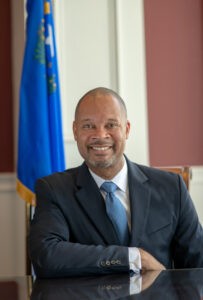
Every February, my family and I celebrate Black History Month. For the Fords, Black History Month begins with a conversation. We discuss the pertinent happenings of our time; we talk about great black leaders; and perhaps most importantly, we take the time to thank and recognize those around us who in different ways have been a part of black progress.
For me, Black History Month isn’t just a date to calendar every year. This month is rooted in black struggle. A few years ago, I learned that an ancestor of mine, William Berry, was on the auction block in Fordyce, Arkansas. That day he protested his own sale saying, “I will not be treated like cattle. You will not sell me and separate me from my family.” Unfortunately, his words were not met with mercy. Instead, he was killed on the spot and his three young sons were sold to slavers in Texas. One of those sons is my great, great, great grandfather. This story of my ancestry really gave new meaning to my plight for equality. In a time when black men, women and children were silenced, William stood up for his own humanity. He said ‘no’ to slavery and inequality, even at the expense of his own life.
I was elected to office about two years ago as the first African American attorney general in Nevada and the first African American to hold statewide constitutional office in Nevada. It is, without a doubt, the honor of a lifetime, and I don’t take my representation in the African American community lightly. William’s story has become a mantra for me in my day-to-day work. It serves as a reminder of where I came from—both as an African American and as a Ford. But it also reminds me that there are so many individuals, families and communities that struggle and that are vulnerable. Irrespective of what backlash I may face for my choices and decisions while in office, I am determined to stand up for those who need a voice and a platform, and am determined to seek out justice at every available corner.
In thinking about what I wanted to share with you about Black History Month, I went back to the roots of black history to Carter G. Woodson who many consider to be the “Father of Black History.” Born in 1875 to former slaves, Woodson was the second African American to earn a doctorate from Harvard. He was unable to attend school for much of his childhood and began high school at age 20. He had to put off schooling while he worked in the coal mines of West Virginia, and went on to earn degrees from Berea College, the University of Chicago and Harvard. In 1926, he created what he called “Negro History Week”, before later going on to lobby extensively to establish Black History Month. Woodson believed that appreciating a people’s history was a prerequisite to equality. He wrote, “If a race has no history, if it has no worthwhile tradition, it becomes a negligible factor in the thought of the world.” What Woodson is so eloquently saying is that no amount of legislation can grant you equality if a country doesn’t value you.
Black History Month is more than just a celebration and it’s more than a commemoration of African American contributions to this country. Black History Month at its core was an effort to establish equality: an effort to highlight and encourage diversity. A time to reflect and think ahead. Black History Month is a reminder that differences should be celebrated not segregated. This month puts a spotlight on the great pioneers before us who have shaped our lives and communities: Rosa Parks, Nelson Mandela, Malcolm X, Maya Angelou, and so many more. And they have provided us with the tools we need to move forward as a community under one human race. Here are some of their words and I hope they will inspire your action.
- “If you want the cooperation of humans around you, you must make them feel they are important—and you do that by being genuine and humble.” –Nelson Mandela
- “You must never be fearful about what you are doing when it is right.” –Rosa Parks
- “When ‘I’” is replaced by ‘we’ even illness becomes wellness.” –Malcolm X
- “If my mind can conceive it, and my heart can believe it, then I can achieve it.” –Muhammad Ali
Diversity must always be a conversation that we continue in our daily lives. It’s about what we all bring to the table regardless of our race, age, background and experience. Together, we bring a lot to the table. When I think about Black History Month, I think about love, honor, respect and possibility. As Nevada’s attorney general, I have made it a focus of my administration to protect and advocate for Nevadans of every age, color, creed and background. I use the term “Nevada Family” broadly—whether you’re a three generation Nevadan or you moved to Nevada a week ago, you’re Nevada family. Whether you’re a single mother with two kids or a family of nine, you’re Nevada family. Regardless of whether you’re affluent or indigent, you’re Nevada family, and my office stands ready to help and support you.
To all of you taking the time to read this article, I thank you. Change and diversity require learning and education. They require a conversation—many in fact. And finally, they demand action. Black history should be shared, celebrated and discussed this month and every month, and I hope you will join me in doing just that.
Aaron D. Ford is Nevada's 34th Attorney General and the first African American to hold statewide constitutional office in Nevada.
